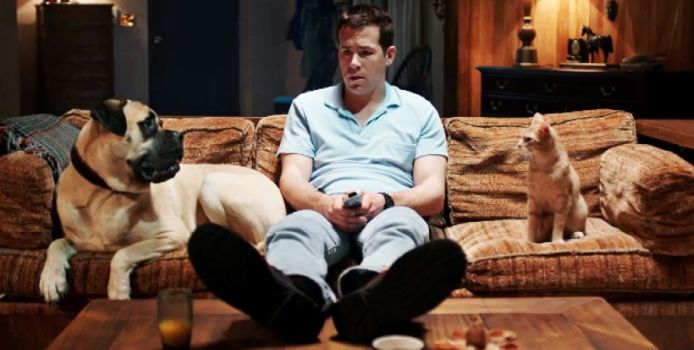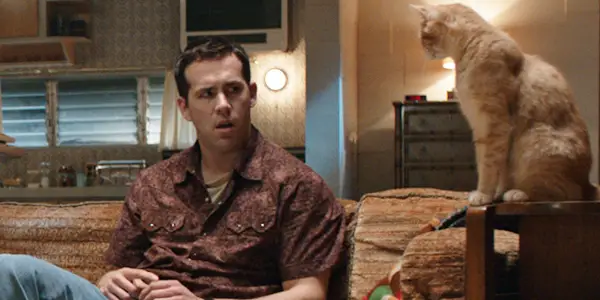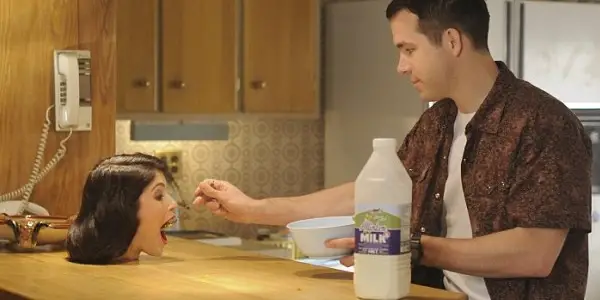THE VOICES: A Laugh-Free Black Comedy

Alistair is a 25 year old writer based in Cambridge.…
The Voices, the English language debut of French-Iranian director Marjane Satrapi, unarguably gives Ryan Reynolds the best acting role of his career. Sadly, his gleefully maniacal performance is the sole positive – and that is most likely due to the lack of interesting roles he’s been given throughout his career that make this performance stand out in comparison. The character he’s playing is badly devised and written, yet Reynolds somehow manages to make the character compelling. Nonetheless, you are still left wishing that you could find this one-note character as interesting as both he and director Satrapi presumably find him.
A problematic depiction of mental illness
Reynolds plays Jerry, an oddball small-town factory worker. Jerry suffers from an unspecified mental illness, one that makes him have vivid hallucinations that take over his life, most notably that his dog and his cat are the metaphorical angel and devil on his shoulders, manipulating every choice he makes. His cat Mr. Whiskers (both pets are voiced by Reynolds in terrible accents) repeatedly undermines Jerry’s lack of success with women, something heightened by being stood up on a date with English expat Fiona (Gemma Arterton). After asking Jerry for a lift home, he crashes his truck into a deer, which he then kills – after running away in horror, Jerry kills Fiona too, leaving her head in his fridge, which he hallucinates as still very much alive and desperate for another head to join her.

I share the belief that there should be no subject considered too offensive to make jokes about, with a comedy only becoming offensive if the jokes aren’t well written enough to sidestep any criticism. Although Reynolds’ performance is enjoyable, it is hard to argue against the fact that Jerry is something of an offensive character due to how badly written he is. His mental illness conditions are too broad to be specified as any one particular illness, with the movie instead suggesting he might just be insane in order to avoid any discussions of his mental state that would otherwise stop the comedy.
Screenwriter Michael R. Perry, whose only previous credit is Paranormal Activity 2, does his best to avoid dwelling on his mental state for too long, instead fixating on the surreal and comedic hallucinations rather than the reasoning for the condition that caused them, which is shrugged off every time it gets mentioned. The movie seems to believe that Jerry is a sympathetic character who is just making bad decisions, again using the unspecified mental illness theme as a get out clause to hide the fact he is written as nothing more than a pale imitation of Norman Bates.
Is the comedy lost in translation?
If it wasn’t for the poor credentials of the screenwriter, it could be argued that the movie’s failure is due to Satrapi’s comedic sensibilities getting lost in translation. Satrapi is best known internationally for her terrific 2007 co-directed debut Persepolis, adapted from her autobiographical graphic novels. The secret to that film’s success was how she took the specifics of her young life, starting as an Iron Maiden and Bruce Lee worshipping girl in pre-revolution Iran before being made to move to Austria for being too much of an outcast, turning them into a piece of cinema that was a truly universal coming of age story. All of Satrapi’s artistic obsessions and influences are clearly specified in that movie, showing that a movie as unclassifiable as The Voices isn’t likely to be an anomaly in her increasingly eclectic filmography.

Yet the movie differs from her earlier work due to the fact it could be easily interpreted as misogynist. Growing up in Iran, where women are often repressed in many aspects of day-to-day life, her decision to direct a movie about the beheading of women could be seen as her making a black-comedy dealing directly with misogyny and the perceived nature of male violence against women. Her intentions are honourable, but are undermined by the fact the screenplay doesn’t flesh out these thematic ideas, resulting in a movie that is accidentally misogynist (every major female character is either a victim or potential victim), as well as misrepresenting mental illness.
The biggest problem with The Voices is that it’s trying too hard to be a cult classic, pulling out all the stops to make quirky scenes, even concluding the film with a musical number starring none other than Jesus himself. No film that tries hard to become a cult classic will ever find its cult – in terms of bad movies, there is a reason a movie like The Room will be an enduring favourite and a deliberately bad movie like Sharknado will vanish into pop-culture obscurity. In terms of offbeat movies like The Voices, movies that have a surrealist or blackly comic approach to the humour always aim for mainstream success, finding cult audiences if they are initially a failure. The Voices tries too hard to be “weird” in a way that makes it seem like it wants to avoid any initial chance of success in order to become a cult favourite straight away.
VERDICT
Despite committed performances, The Voices can never transcend the inherent problems in its screenplay. If Ryan Reynolds can give performances as enjoyable as this with such bad material, maybe it is time for him to fire his agent and get himself a new one that rewards him with more challenging performances. As for Marjane Satrapi, this movie is very likely a minor blip – with a proven track record at making movies with both style and substance, it was inevitable she was one day going to make a movie that didn’t perfect the balance.
Have you seen The Voices? Do you think Ryan Reynolds is a good actor in bad movies or a bad actor in bad movies?
The Voices is available on DVD now in the US, with a UK release imminent. All international release dates are here.
(top image source: Lionsgate)
Does content like this matter to you?
Become a Member and support film journalism. Unlock access to all of Film Inquiry`s great articles. Join a community of like-minded readers who are passionate about cinema - get access to our private members Network, give back to independent filmmakers, and more.
Alistair is a 25 year old writer based in Cambridge. He has been writing about film since the start of 2014, and in addition to Film Inquiry, regularly contributes to Gay Essential and The Digital Fix, with additional bylines in Film Stories, the BFI and Vague Visages. Because of his work for Film Inquiry, he is a recognised member of GALECA, the Gay & Lesbian Entertainment Critics' Association.













